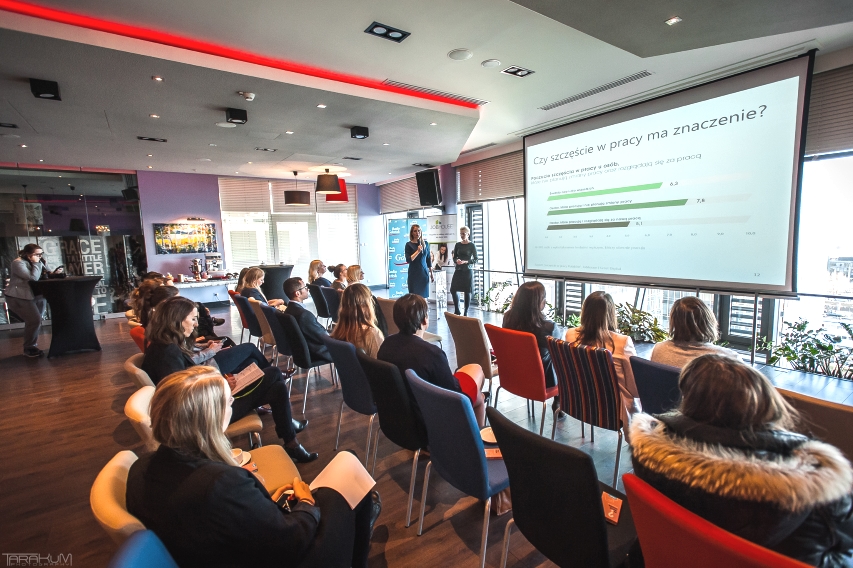We talk about happiness at work with Natalia Bogdan, President of Jobhouse, a nationwide temporary employment and personnel consulting agency, which carried out an unusual study. Its aim was to analyse whether Poles are happy at work, what this level of satisfaction depends on and to identify what should change to make Poles more willing to recommend their jobs. The report was presented on 21 November at Olivia Business Centre.
Work is an important part of our lives, we spend an average of 40 hours a week working at work, improving our skills, gaining knowledge to advance and climb the career ladder, and the financial benefits we get from it determine our level of well-being. However, the question arises, does the work we do make us happy?
According to the above-mentioned study entitled “Happiness at work of Poles”, 88% of Poles believe that a good salary helps to be happy, 47% say that the place of work is as important as the work done there. As many as 63% declare their willingness to change their place of residence for the sake of a better job, and 29% of respondents would definitely recommend their job to friends.
A good salary, co-workers you can count on, development opportunities, work-life balance, and commute time are the most important factors that make people feel happy at work. And although the survey shows that Poles are moderately happy in their workplaces (6.3 on a scale from 1 to 10), those who do not plan to change their jobs at the moment are definitely more satisfied.
The study was carried out on a sample of N=901 people with secondary and higher education who are currently working, mostly in large cities. The survey was carried out between 12.06.2017 and 31.08.2017 using an online survey commissioned by Jobhouse by the Great Digital agency.
–/ —
Monika Bogdanowicz (Olivia Business Centre): Why is it worth analysing the topic of happiness at work, who needs this knowledge most of all today?
Natalia Bogdan: I think everyone. I believe that happiness or lack thereof at work translates into other areas of life. I don’t think that someone who is not happy with how their professional career is developing or has a boss who clips their wings, can be kind to their loved ones and full of energy to act.
MB: Are we currently at a stage in the development of the labour market in which our emotions and feelings related to the organisational culture of companies are starting to play an increasingly important role?
NB: Yes, definitely. More and more people pay attention not only to the material aspects of work. In the past, the main, and often the only, motivator at work was money. Of course, they are also important now – after all, we live on salaries, but more and more people also pay attention to the fact that work gives us opportunities to develop, meet interesting people and pursue our passions. As our study “Happiness at work of Poles” has shown, we care more and more about maintaining a balance between work and private life.
MB: What can we learn from the report prepared by your company?
NB: That Poles on a scale of 0 to 10 are happy working at 6.3. This is a satisfactory result, but we still have room for improvement. This result differs significantly between people who work and do not plan to change jobs (they rated their level of happiness at 7.8) and those who do work but are thinking about changing (they are satisfied at 5.1). This is an important signal to employers that nowadays we don’t have to be extremely unhappy at work to start looking for a new job.
We also identified factors that determine the level of happiness at work. For 88% of respondents, salary was a good factor in happiness at work. Factors such as co-workers you can count on (84%) and development opportunities at work (81%) also ranked very highly. Other factors were related to work-life-balance – 80% of respondents indicated the possibility of reconciling work and private life, and 76% indicated a rather surprising factor, namely the time of commuting to work.

MB: What are the main conclusions and recommendations both for people who are looking for attractive companies and for companies that want to convince about the high quality of job offers?
NB: First of all, employees should think about what determines their job satisfaction and think about what tasks and companies can provide them with. Only on this basis should we look for a job. Employers, on the other hand, should analyze what employees indicate as important in the workplace and adapt their offer to the needs of the market, as well as present it appropriately in their communication with candidates.
MB: How can we distinguish in your report the semantic use of the terms: satisfaction, level of satisfaction and happiness, which are usually used when analysing a topic in the HR industry?
NB: We titled our report “Happiness at work of Poles”. Of course, there are many definitions of happiness, and the feeling of happiness itself is very subjective, which is why we did not create a clear definition of this concept in our study. We wanted the respondents to assess for themselves how happy they are and what it means for them.
MB: Is it important for employees to know the workplace itself, where it is located, what is its aesthetics and interior design, and the quality of the space outside the office, e.g. is there a place to rest?
NB: 48% of respondents answered that comfortable working conditions in the office help to be happy at work. 25% of respondents said that the conditions in their office would have to change to make them willing to recommend it. However, we did not define what the respondents understood as comfortable working conditions.
MB: In your opinion, what is the main reason why a given company is/can be perceived as an example of good practices in shaping the work environment, which can contribute to the happiness of its employees?
NB: In my opinion, the most important thing is for the company to take care of both the material and non-material needs of its employees. In addition to a salary that makes it possible to live with dignity, it is important to take care of employee development opportunities, a team atmosphere, and a work-life balance.

MB: How could each of us answer the question of whether we can measure our level of happiness, which determines our decisions and conscious choices made in the situation of choosing or wanting to change jobs?
NB: By creating a study entitled “Happiness at work of Poles”, we wanted to encourage Polish employees to reflect on their own sense of happiness at work. In my opinion, each of us should consider whether what we do gives us satisfaction and the opportunity to meet our needs, not only material. If there are areas in which we are not entirely satisfied, it is worth considering what we ourselves can influence and what is worth suggesting to the boss.
MB: What was the most surprising aspect of this study and do you plan to explore the topic of happiness at work further?
NB: What surprised me the most was that Poles are not willing to recommend their jobs. To investigate this parameter, we used the Net Promoter Score (NPS), which shows the ratio of critics to promoters. The Poles’ score on a scale from -100 to 100 was only -14. For comparison, the NPS used in consumer tests of brands such as Harley-Davidson or Apple is over 70.
MB: Are you planning further editions of the survey?
NB: Yes, we have received a lot of positive feedback on the survey from both employees and employers. We plan to repeat it every year to observe how the level of happiness of Poles changes and whether the factors on which it depends change. During meetings with employers, employees and the media, during which we discussed the results of the study, we received many valuable tips on the other directions in which we could develop our study.

MB: Thank you for the interview.
YOU CAN DOWNLOAD THE “HAPPINESS AT WORK” REPORT HERE
–/ —
Natalia Bogdan is the founder of the Jobhouse recruitment agency, a headhunter, career advisor and labour market expert. She graduated in Human Resources Management and Labour Law from the University of Gdańsk and Human Resources Management from the Instituto Politecnico do Porto and the Strategic Leadership Academy from the Ican Institute. Currently, she is a lecturer at Kozminski University in the field of Recruitment and Selection. She has been involved in the HR industry for over 12 years. She gained her experience in the United Kingdom, the United States, the Netherlands and Portugal. In 2017, she was awarded the title of Businesswoman of the Year in a competition organized by Olga Kozierowska and Success Written in Lipstick. Privately, she is passionate about a healthy lifestyle – she has completed several marathons, half-marathons and triathlons, and is currently preparing for an expedition to Kilimanjaro. She loves sports, traveling and healthy eating.




